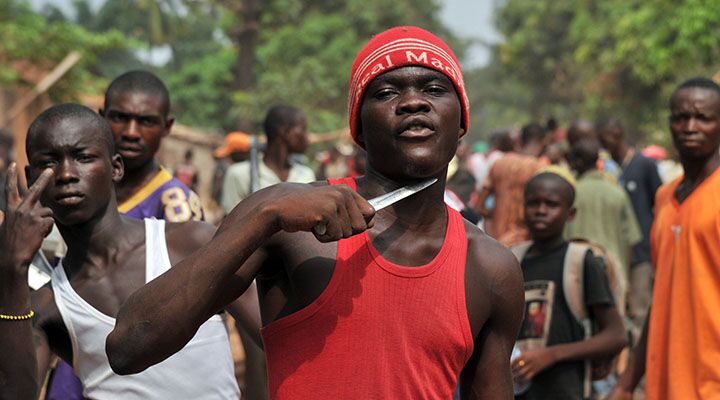
Pope Francis’s Most Dangerous Trip Yet
In what would be a first, Pope Francis may be forced to cancel his visit to one of the African nations on his November itinerary: the Central African Republic (C.A.R.).
The pontiff’s schedule includes a visit to Kenya on November 25-27, Uganda on November 27-29, and possibly C.A.R. on November 29-30. The Vatican announced November 2 that the pope’s trip to the violence-stricken nation remains “on the program.” Vatican deputy spokesman Ciro Benedettini told Agence France-Presse that “Francis greatly desires to go there.” But he also indicated the trip to C.A.R. may be canceled for security concerns.
In his November 1 message at St. Peter’s Square, the pope himself shifted from the certainty he had previously expressed regarding the trip to the Central African Republic. He spoke of it as the “trip I hope to be able to make ….” A senior Vatican official explained the pope’s comments thus: “If the situation worsens, he will not be able to go, and he is aware of that.”
If the trip proceeds as planned, Francis will travel to C.A.R. capital Bangui, where he will visit a refugee camp, a mosque in a notoriously dangerous Bangui neighborhood, and a stadium where he’ll observe mass.
But the Central African Republic is trapped in a “cycle of violence,” as Pope Francis described it. As we catalogued in our article “Central African Republic—The Definition of Catastrophe,” this cycle of violence is more than just another African problem—it’s a full-fledged religious war between Christians and Muslims.
The most recent spate of violence in C.A.R. began in September when militants incited people to avenge the death of a Muslim man who was murdered while operating his motorcycle taxi. Since then, at least 90 people have been killed and hundreds of structures have been destroyed, including a church building and a mosque.
On October 29, three Muslims were attacked when they left their Muslim refuge PK5. Two of them were killed and chopped into small pieces. The third was stoned to death. A shell-shocked witness added some disturbing details of the murder: “Even children were stoning the man who moaned and begged for mercy before dying.” Later that day, a Christian was murdered in retaliation.
Two days later, at least two people were killed and “several houses were torched and heavy gunfire was heard in … Christian districts besieged by armed Muslims,” a military official reported.
More have been killed in the following days.
The volatility of the situation makes reporting exact statistics difficult. Organizations like the Human Rights Watch, for example, have resorted to satellite imagery analysis to report on property damage. Last year, cctv Africa reported on a savage scene that was “unusual only because the cameras were there.” A man was lynched by C.A.R. soldiers just moments after a military ceremony in which interim-president Catherine Samba-Panza promised to rebuild the army and restore peace.
An Associated Press photographer at the scene wrote to Time about what he observed:
Today, I met the devil. In a scene [horror movie director] Quentin Tarantino would not have dreamed scripting, I saw a man killed. Butchered. By his fellow countrymen. His mistake was to be named Idris, and to be Muslim. What was first an orderly cheering crowd happy to hear they were finally going to get paid, turned in an instant into a tidal wave of barbarism. The vips had barely left. We have reached the point of no return in sectarian violence.
In the Central African Republic, Christians and Muslims are murdering each other in cold blood and in broad daylight.
It’s highly likely that Pope Francis will cancel his trip to the Central African Republic. If he does, it would be significant to note what message the cancellation will send to the world about the religious war in that nation.
It would be even more significant to note what message that cancellation would send to Pope Francis himself. To get an idea, research the history of how the Roman Catholic Church has traditionally responded to persecution from Muslims. Trumpet editor in chief Gerald Flurry’s article “The Last Crusade” is a great starting point.
